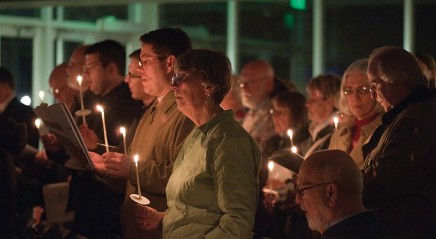The doors of your church building have magical properties. You may not have noticed, but these magical effects play out differently for outsiders than for insiders.
When outsiders approach church doors, the magic repels them with thoughts that they aren’t good enough, knowledgeable enough, worthy enough or perfect enough to come inside. Many outsiders are rightly critical of the church they hear about in news headlines that symbolizes only judgment and intolerance.
For insiders, however, these magical properties have a different effect. Insiders pass eagerly through the doors of the building to find renewal and hope. But to return outside, these same insiders must fold up their Christian faith into a tiny bundle and hide it in their pocket or purse until they return to the church and take it back out. Insiders hide their faith in a compartment that is accessed only when gathered with other Christians in the church building.
For insiders, however, these magical properties have a different effect. Insiders pass eagerly through the doors of the building to find renewal and hope.
Our dominant approach in responding to the magical doors is to double down on what we do inside our buildings. We search high and low for programs and activities that will attract and encourage outsiders to become insiders.
By doing so, we neglect the most critical factor: our baptismal calling as members of the body of Christ to take faith out of its hidden compartment and share it through our words and actions in our everyday roles and relationships.
At the time of the Reformation, Martin Luther proposed that all church members belong to a universal priesthood. This core teaching never became our normal way of being church, but the ELCA Life of Faith Initiative aims to equip all God’s people for the work of ministry (Ephesians 4:12) in the arenas of daily life: family, work, school, local community, citizenship and care for creation.
How can we stir up a culture change that focuses the church’s mission on the vocation of the baptized in these arenas?
A universal neighborhood
In The Scattering: Imagining a Church That Connects Faith and Life (Wipf and Stock, 2015), Dwight L. DuBois says congregations need to close the gap between what they do when gathered behind church doors and how they live when sent beyond those doors in Christ’s name. They need to create a universal neighborhood of all believers.
This means taking our baptismal promises seriously again, found in the Affirmation of Baptism (Evangelical Lutheran Worship).
Do you intend to continue in the covenant God made with you in holy baptism:
To live among God’s faithful people?
To hear the word of God and share in the Lord’s Supper?
We need to affirm that everything we do as the gathered church forms us for a distinctive way of life. Worship practices are life practices. Confessing our sins trains us for the practice of telling the truth. Singing hymns forms us to thank and praise God. Hearing God’s word centers us in the gospel for every life circumstance.
Congregations are summoned to form members who can connect faith and life. This requires adaptive change to turn congregations inside-out.
Confessing the creed is our pledge of allegiance. The intercessions both bring our concerns to God and commit us to responsibility in caring about the people and needs for which we pray. Passing the peace prepares us for everyday reconciliation and peacemaking. At the Lord’s table, we discover radical mercy and hospitality that become our way of life. When we are sent out into the world, our worship practices will have shaped us for discipleship in daily life.
Do you intend to continue in the covenant God made with you in holy baptism:
To proclaim the good news of God in Christ through word and deed?
To serve all people, following the example of Jesus?
To strive for justice and peace in all the earth?
Congregations are summoned to form members who can connect faith and life. This requires adaptive change to turn congregations inside-out. Educational programs for all ages should begin to explore what faith means for daily life. Members should be invited to testify about how their Christian faith makes a difference in the world.
Pastors should develop dialogue sermons in partnership with members to talk about intersections between faith and life. Small groups should bring people together for prayer and conversation based on affinities they share—their family roles, their jobs, their season of life. All these practices transform congregations into incubators where being church means living out our Christian vocation in everything we say and do.
What does this look like in people’s lives? It looks like people speaking authentically about the difference Jesus Christ makes in all life circumstances. It looks like people who claim everything they do as a way of living out their baptismal promises in service to others.
For more information on the Life of Faith Initiative, go to lifeoffaith.info.









